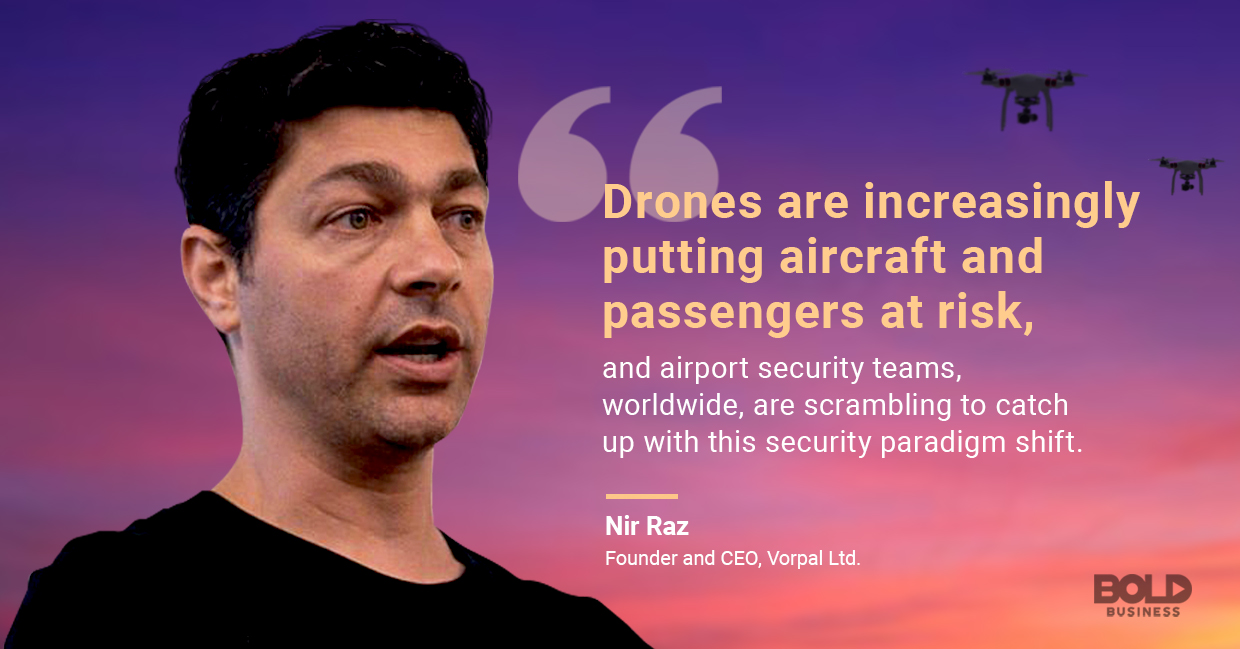Featured on BoldBusiness.com: Vorpal And It’s Anti-Drone Technology Are Clearing the Airways

According to the Federal Aviation Administration, there were over 1 million unmanned aerial vehicles (UAVs) registered as of 2018. Better known as drones, UAVs have strict areas where they may travel. But increasingly, whether intentionally or through ignorance, drones are finding their way into restricted areas. Because of this, many are seeking anti-drone technology to combat the problem. And Vorpal Ltd., an Israeli-based company, is providing effective solutions.
From airports to homeland security, drones have the potential to cause serious disruptions. While it may seem feasible that drones could be easily detected using standard radar techniques, that is not the case. In fact, anti-drone technology requires more complex insights and strategies. As this need grows and the threats become more serious, companies like Vorpal are striving to address these issues head-on.
Vorpal was founded in 2009 as the prevalence of drones became increasingly evident. Interestingly, Vorpal’s expertise evolved out of military operations involving signal intelligence. Through advanced signal processing and analysis solutions, Vorpal developed an anti-drone technology based on radiofrequency geolocation strategies. Its VigilAir products are now recognized globally as a significant advancement in mitigating solutions.
Of course, Vorpal is not the only company involved in mitigating the undesirable effects of a rising drone population. Other players in the space include QinetiQ Group, Optix, and Chess Dynamics. However, different companies have pursued anti-drone technologies in different ways. Some have developed kinetic drone defenses, while others have focused on paralyzing drones through the use of jammer guns. However, it is notable that these approaches may be illegal in some instances and ineffective in others.
Vorpal’s strategy is unique. Its anti-drone technology identifies both the drone and drone operator through the use of its radiofrequency geolocation solutions. Once the identification is achieved, Vorpal’s system mimics the drone’s command and control operations. This detail allows a “soft” takeover of the drone, which can then be landed safely out of harm’s way. In this way, Vorpal avoids legal issues that support aircraft protection since the drone itself is not destroyed or damaged…
… More recently, Vorpal has been exploring partnerships with AT&T as well as Microsoft’s Azure cloud solutions. Through the use of information technologies, Vorpal could implement low-latency responses to broader regions. Likewise, this case would facilitate greater computing scalability needed to regulate drone traffic more effectively. All these reflect the types of changes being pursued in order to keep pace with the rising security threats that drones pose.
Indeed, the bold moves that Vorpal and others are making in anti-drone technology solutions should be highly valued given today’s climate. Their inclusion in the Florida Israeli Business Accelerator (FIBA) program, is also helping to boost the companies fortunes.
Read the full article on Bold Business here.
Latest News
-
Next Round’s On The Robot!
July 16, 2024 11:51 am
-
The Startup Nation Meets Miami
April 18, 2024 11:32 am
-
FIBA Co-Executive Directors Receive Professional Societies Award
April 14, 2024 11:31 am
-
Shaping the Future: Women Entrepreneurs Leading the Charge in Tampa Bay
March 29, 2024 9:48 am
-
Five Star Customer Experiences: Lessons from Hospitality Leaders
March 8, 2024 9:47 am
